This Extremely Popular Instagram Career Advice Is A Really Bad Idea
by Audie Metcalf
Instagram pretends to know a lottttt about how the world works.
I say Instagram as a collective because even when individual brands have their own unique missions and ideas, we still all play by Instagram’s rules to grow, to scale, to win.
And recently, a certain kind of bad advice has been popping up everywhere on my Instagram feed. Now typically, most of these reductive, millennial ideas drift right on by my 40+ eyes. But this one in particular is so bad, I couldn’t keep scrolling in silence:
First. A preface.
The core intention is good. The motivation is to say to people, listen, your knowledge is worth something so don’t give it away for free. But, blunt instrument that Instagram is, the framing of it is expressed mostly as people wanting to take advantage of you. To rob you of your hard earned ideas. And so of course the only way to stop it is to rigidly reject it.
But there are three really big problems here.
Problem 1:
Creating a dynamic where we interpret someone asking something of us into a taker/being taken scenario, robs the situation of a different potential. Speaking from the countless times this has happened in my life, if I had just handed them my rate card, I would have left big opportunities on the table.
Let’s take this situation:
A friend of a friend was looking for advice on how to start building her business on Instagram, and my friend suggested she speak to me. That friend of a friend was abbbbbsolutely wanting to “pick my brain” for ideas. For free. Now, my ideas have value. I know this. I get paid for my ideas. I’m getting paid to write this article you’re reading right now. But instead of pushing back or demanding a fee, I said I would have a call with her. Prior to the call, I researched her, lightly stalked her on LinkedIn, and saw she was connected to someone I had been interested in talking with. So now, 30 minutes of my time have created my own value with something that was beneficial to me. After we spoke, we stayed in touch. She email intro’d me to the woman I was interested in chatting with, and from there I met another handful of people who have all played a part in various projects I’ve worked on. All of which were lucrative.
This is one of maybe hundreds of situations where being strategic when being asked to give my time for “free” has benefited me. My time has value. And I get to determine that value.
“my time has value. And I get to determine that value.”
Problem 2:
Let’s talk about that word “value” for a minute.
I think when we create such an inextricable link between our “value” and our “selves” we are wrapping up our self-worth in a lot of externalized ideas where it doesn’t belong.
I have value simply because I exist. Whether I want to spend my time on a phone call with a stranger as a favor is really more about my decision as to whether I can spare that time, whether I can relay that time spent into something helpful for my own career, or whether I have the energy to give to someone that day.
Once I wrap those ideas into my “value” as a person or even my time, the waters start to feel muddy, as if any of those things have anything to do with who I am. They don’t. They have to do with what I do. Now, maybe they have to do with my (or your) tenuous and shitty relationship with boundaries but that’s another story altogether. No, really. It’s another story we wrote. And we wrote it because we really suck at boundaries.
Problem 3:
To me, one of the many other elephants in the “pick your brain” room, is this: if someone is picking YOUR brain, aren’t you the one with more experience or knowledge? Doesn’t that mean that, at least sometimes, they’re younger, they’re starting out, they’re starting something new, and you can help?
Didn’t all of us wish we had that when we were starting out?
I give as much help as I possibly can to anyone who asks for it, if they’re just starting out. Because if I do a Zoom call with a young social media manager who is going out on her own, isn’t part of our actual “value” wrapped up in the way we treat others? I think it takes a lot of courage to ask for help or to be vulnerable with someone who knows more than you, or has access to information you want. It means admitting you need them in some way. And for me, those 30 minutes on a Zoom call feel like a great value for me. If I volunteered at a soup kitchen, isn’t that still valuable?
And listen, not everyone will be some fresh-faced 23 year old with pure intentions, hanging on your every, sage word. Sometimes it will be some douchebag named Doug who interned at Red Bull and your old boss who gaslit you in front of your whole team is now asking you to let Doug “pick your brain” over a $7 latte. This is a different scenario. But it’s still your choice. You can sleuth Doug’s deeply annoying social media full of him doing idiotic extreme sports with all of his horrifying “bros” and realize Doug’s dad is an Angel investor so that when you go to your coffee date, you go in with your eyes wide open. And who knows, maybe you marry Doug eventually. Sidebar: please don’t marry Doug.
So.
This last one doesn’t get its own number, but mostly because it’s gonna make some of you mad.
There’s about 178 ways to say no or “punt” as they say in corporate America. So if someone asks to pick your brain, and you can’t find an elegant way of turning them down without handing them your rate card in the rigid way Instagram is trying to trick us into thinking is “strong,” you’re not controlling the conversation anymore.
We think that being good at our jobs is doing the thing we’re good at it. And it is. But a lot of being good at our jobs is figuring out our social persona. That doesn’t mean being fake. It means being strategic. Being strategic is also a way to think about yourself, your needs, your career, what you want out of it, the people you need to meet to get where you want to go. And if you create a relationship of instant combat by asserting some Instagram-approved clap-back when someone simply asks you a question, well, that’s just bad strategy. And it probably won’t lead you to the career of your dreams.
Remember this: Instagram tells us black and white ideas like this work better because it means people will fight with each other in the comments. So then brands assert black and white ideas like this. So then people will fight in the comments. And comments are engagement. And engagement numbers are a digital brand’s highest metric for success.
Who’s strategic now? Feel free to fight about it in the comments.
Audie Metcalf is the Editor-in-chief of The Candidly, and lives in LA with her family. You can find more of her articles here.








